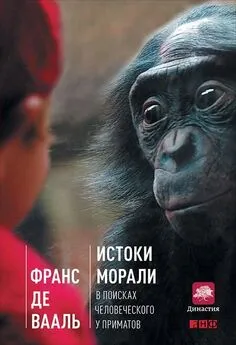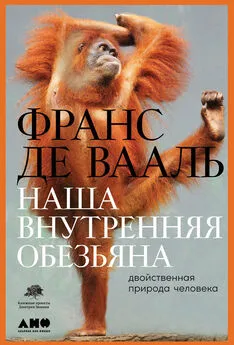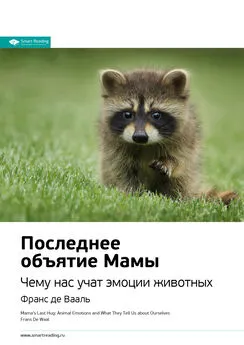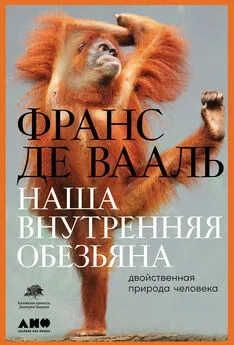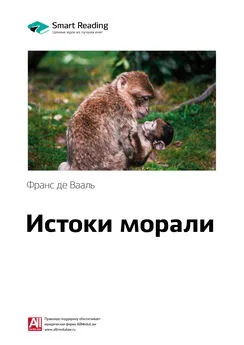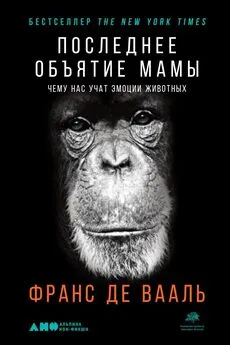Франс де Вааль - Достаточно ли мы умны, чтобы судить об уме животных?
- Название:Достаточно ли мы умны, чтобы судить об уме животных?
- Автор:
- Жанр:
- Издательство:ЛитагентАльпина6bdeff1e-120c-11e2-86b3-b737ee03444a
- Год:2017
- Город:Москва
- ISBN:978-5-9614-4452-0
- Рейтинг:
- Избранное:Добавить в избранное
-
Отзывы:
-
Ваша оценка:
Франс де Вааль - Достаточно ли мы умны, чтобы судить об уме животных? краткое содержание
В течение большей части прошедшего столетия наука была чрезмерно осторожна и скептична в отношении интеллекта животных. Исследователи поведения животных либо не задумывались об их интеллекте, либо отвергали само это понятие. Большинство обходило эту тему стороной. Но времена меняются. Не проходит и недели, как появляются новые сообщения о сложности познавательных процессов у животных, часто сопровождающиеся видеоматериалами в Интернете в качестве подтверждения.
Какие способы коммуникации практикуют животные и есть ли у них подобие речи? Могут ли животные узнавать себя в зеркале? Свойственны ли животным дружба и душевная привязанность? Ведут ли они войны и мирные переговоры? В книге читатели узнают ответы на эти вопросы, а также, например, что крысы могут сожалеть о принятых ими решениях, воро́ны изготавливают инструменты, осьминоги узнают человеческие лица, а специальные нейроны позволяют обезьянам учиться на ошибках друг друга. Ученые открыто говорят о культуре животных, их способности к сопереживанию и дружбе. Запретных тем больше не существует, в том числе и в области разума, который раньше считался исключительной принадлежностью человека.
Автор рассказывает об истории этологии, о жестоких спорах с бихевиористами, а главное – об огромной экспериментальной работе и наблюдениях за естественным поведением животных. Анализируя пути становления мыслительных процессов в ходе эволюционной истории различных видов, Франс де Вааль убедительно показывает, что человек в этом ряду – лишь одно из многих мыслящих существ.
Достаточно ли мы умны, чтобы судить об уме животных? - читать онлайн бесплатно ознакомительный отрывок
Интервал:
Закладка:
Breland, K., and M. Breland. 1961. The misbehavior of organisms. American Psychologist 16:681–84.
Breuer, T., M. Ndoundou-Hockemba, and V. Fishlock. 2005. First observation of tool use in wild gorillas. Plos Biology 3:2041–43.
Brosnan, S. F., et al. 2010. Mechanisms underlying responses to inequitable outcomes in chimpanzees. Animal Behaviour 79:1229–37.
Brosnan, S. F., and F. B. M. de Waal. 2003. Monkeys reject unequal pay. Nature 425:297–99.
–. 2014. The evolution of responses to (un) fairness. Science 346:1251776. Brosnan, S. F., C. Freeman, and F. B. M. de Waal. 2006. Partner's behavior, not
reward distribution, determines success in an unequal cooperative task in capuchin monkeys. American Journal of Primatology 68:713–24.
Brown, C., M. P. Garwood, and J. E. Williamson. 2012. It pays to cheat: Tactical deception in a cephalopod social signalling system. Biology Letters 8:729–32. Browning, R. 2006 [orig. 1896]. The Poetical Works. Whitefish, MT: Kessinger. Bruck, J. N. 2013. Decades-long social memory in bottlenose dolphins. Proceedings of the Royal Society B 280: 20131726.
Bshary, R., and R. Noë. 2003. Biological markets: The ubiquitous inf luence of partner choice on the dynamics of cleaner fish-client reef fish interactions. In Genetic and Cultural Evolution of Cooperation , ed. P. Hammerstein, 167–84. Cambridge, MA: MIT Press.
Bshary, R., A. Hohner, K. Ait-El-Djoudi, and H. Fricke. 2006. Interspecific communicative and coordinated hunting between groupers and giant moray eels in the Red Sea. Plos Biology 4: e431.
Buchsbaum, R., M. Buchsbaum, J. Pearse, and V. Pearse. 1987. Animals Without Backbones: An Introduction to the Invertebrates. 3rd ed. Chicago: University of Chicago Press.
Buckley, J., et al. 2010. Biparental mucus feeding: A unique example of parental care in an Amazonian cichlid. Journal of Experimental Biology 213:3787–95.
Buckley, L. A., et al. 2011. Too hungry to learn? Hungry broiler breeders fail to learn a y-maze food quantity discrimination task. Animal Welfare 20: 469–81. Bugnyar, T., and B. Heinrich. 2005. Ravens, Corvus corax , differentiate between knowledgeable and ignorant competitors. Proceedings of the Royal Society of London B 272:1641–46.
Burghardt, G. M. 1991. Cognitive ethology and critical anthropomorphism: A snake with two heads and hognose snakes that play dead. In Cognitive Ethology: The Minds of Other Animals: Essays in Honor of Donald R. Griffin , ed. C. A. Ristau, 53–90. Hillsdale, NJ: Lawrence Erlbaum Associates.
Burkhardt, R. W. 2005. Patterns of Behavior: Konrad Lorenz, Niko Tinbergen, and the Founding of Ethology. Chicago: University of Chicago Press.
Burrows, A. M., et al. 2006. Muscles of facial expression in the chimpanzee ( Pan troglodytes ): Descriptive, ecological and phylogenetic contexts. Journal of Anatomy 208:153–68.
Byrne, R. 1995. The Thinking Ape: The Evolutionary Origins of Intelligence. Oxford: Oxford University Press.
Byrne, R., and A. Whiten. 1988. Machiavellian Intelligence. Oxford: Oxford University Press.
Calcutt, S. E., et al. 2014. Captive chimpanzees share diminishing resources. Behaviour 151:1967–82.
Caldwell, C. C., and A. Whiten. 2002. Evolutionary perspectives on imitation: Is a comparative psychology of social learning possible? Animal Cognition 5:193–208.
Call, J. 2004. Inferences about the location of food in the great apes. Journal of Comparative Psychology 118:232–41.
–. 2006. Descartes' two errors: Reason and ref lection in the great apes. In Rational Animals , ed. S. Hurley and M. Nudds, 219–234. Oxford: Oxford University Press.
Call, J., and M. Carpenter. 2001. Do apes and children know what they have seen? Animal Cognition 3:207–20.
Call, J., and M. Tomasello. 2008. Does the chimpanzee have a theory of mind? 30 Years Later. Trends in Cognitive Sciences 12:187–92.
Callaway, E. 2012. Alex the parrot's last experiment shows his mathematical genius. Nature News Blog , Feb. 20, http://bit.ly / 1eYgqoD.
Calvin, W. H. 1982. Did throwing stones shape hominid brain evolution? Ethology and Sociobiology 3:115–24.
Candland, D. K. 1993. Feral Children and Clever Animals: Reflections on Human Nature. New York: Oxford University Press.
Cenami Spada, E., F. Aureli, P. Verbeek, and F. B. M. de Waal. 1995. The self as reference point: Can animals do without it? In The Self in Infancy: Theory and Research , ed. P. Rochat, 193–215. Amsterdam: Elsevier.
Chang, L., et al. 2015. Mirror-induced self-directed behaviors in rhesus monkeys after visual-somatosensory training. Current Biology 25:212–17.
Cheney, D. L., and R. M. Seyfarth. 1986. The recognition of social alliances by vervet monkeys. Animal Behaviour 34 (1986): 1722–31.
–. 1989. Redirected aggression and reconciliation among vervet monkeys, Cercopithecus aethiops. Behaviour 110: 258–75.
–. 1990. How Monkeys See the World: Inside the Mind of Another Species. Chicago: University of Chicago Press.
Claidière, N., et al. 2015. Selective and contagious prosocial resource donation in capuchin monkeys, chimpanzees and humans. Scientific Reports 5:7631. Clayton, N. S., and A. Dickinson. 1998. Episodic-like memory during cache recovery by scrub jays. Nature 395:272–74.
Corballis, M. C. 2002. From Hand to Mouth: The Origins of Language . Princeton, NJ: Princeton University Press.
–. 2013. Mental time travel: A case for evolutionary continuity. Trends in Cognitive Sciences 17:5–6.
Corbey, R. 2005. The Metaphysics of Apes: Negotiating the Animal-Human Boundary. Cambridge: Cambridge University Press.
Correia, S. P. C., A. Dickinson, and N. S. Clayton. 2007. Western scrub-jays anticipate future needs independently of their current motivational state. Current Biology 17:856–61.
Courage, K. H. 2013. Octopus! The Most Mysterious Creature in the Sea. New York: Current.
Crawford, M. 1937. The cooperative solving of problems by young chimpanzees. Comparative Psychology Monographs 14:1–88.
Crockford, C., R. M. Wittig, R. Mundry, and K. Zuberbühler. 2012. Wild chimpanzees inform ignorant group members of danger. Current Biology 22:142–46.
Csányi, V. 2000. If Dogs Could Talk: Exploring the Canine Mind. New York: North Point Press.
Cullen, E. 1957. Adaptations in the kittiwake to cliff-nesting. Ibis 99:275–302. Darwin, C. 1982 [orig. 1871]. The Descent of Man, and Selection in Relation to Sex. Princeton, NJ: Princeton University Press.
Davila Ross, M., M. J. Owren, and E. Zimmermann. 2009. Reconstructing the evolution of laughter in great apes and humans. Current Biology 19:1106–11.
de Groot, N. G., et al. 2010. AIDS-protective HLA-B*27 / B*57 and chimpanzee MHC class I molecules target analogous conserved areas of HIV-1 / SIVcpz. Proceedings of the National Academy of Sciences, USA 107:15175–80.
de Waal, F. B. M. 1991. Complementary methods and convergent evidence in the study of primate social cognition. Behaviour 118:297–320.
–. 1996. Good Natured: The Origins of Right and Wrong in Humans and Other Animals. Cambridge, MA: Harvard University Press.
–. 1997. Bonobo: The Forgotten Ape. Berkeley: University of California Press.
–. 1999. Anthropomorphism and anthropodenial: Consistency in our thinking about humans and other animals. Philosophical Topics 27:255–80.
–. 2000. Primates: A natural heritage of conf lict resolution. Science 289: 586–90.
–. 2001. The Ape and the Sushi Master: Cultural Ref lections by a Primatologist. New York: Basic Books.
–. 2003a. Darwin's legacy and the study of primate visual communication. In Emotions Inside Out: 130 Years After Darwin's «The Expression of the Emotions in Man and Animals,» ed. P. Ekman, J. J. Campos, R. J. Davidson, and F. B. M. de Waal, 7–31. New York: New York Academy of Sciences.
–. 2003b. Silent invasion: Imanishi's primatology and cultural bias in science. Animal Cognition 6:293–99.
–. 2005. Our Inner Ape. New York: Riverhead.
–. 2007 [orig. 1982]. Chimpanzee Politics: Power and Sex Among Apes. Baltimore: Johns Hopkins University Press.
–. 2008. Putting the altruism back into altruism: The evolution of empathy. Annual Review of Psychology 59:279–300.
–. 2009a. The Age of Empathy: Nature's Lessons for a Kinder Society. New York: Harmony.
–. 2009b. Darwin's last laugh. Nature 460:175.
de Waal, F. B. M., and M. Berger. 2000. Payment for labour in monkeys. Nature 404:563.
de Waal, F. B. M., C. Boesch, V. Horner, and A. Whiten. 2008. Comparing children and apes not so simple. Science 319:569.
de Waal, F. B. M., and K. E. Bonnie. 2009. In tune with others: The social side of primate culture. In The Question of Animal Culture , ed. K. Laland and B. G. Galef, 19–39. Cambridge, MA: Harvard University Press.
de Waal, F. B. M., and S. F. Brosnan. 2006. Simple and complex reciprocity in primates. In Cooperation in Primates and Humans: Mechanisms and Evolution , ed. P. M. Kappeler and C. van Schaik, 85–105. Berlin: Springer.
de Waal, F. B. M., M. Dindo, C. A. Freeman, and M. Hall. 2005. The monkey in the mirror: Hardly a stranger. Proceedings of the National Academy of Sciences USA 102:11140–47.
de Waal, F. B. M., and P. F. Ferrari. 2010. Towards a bottom-up perspective on animal and human cognition. Trends in Cognitive Sciences 14:201–7.
de Waal, F. B. M., and D. L. Johanowicz. 1993. Modification of reconciliation behavior through social experience: An experiment with two macaque species. Child Development 64:897–908.
de Waal, F. B. M., and J. Pokorny. 2008. Faces and behinds: Chimpanzee sex perception. Advanced Science Letters 1:99–103.
de Waal, F. B. M., and P. L. Tyack, eds. 2003. Animal Social Complexity: Intelligence, Culture, and Individualized Societies. Cambridge, MA: Harvard University Press.
de Waal, F. B. M., and J. van Hooff. 1981. Side-directed communication and agonistic interactions in chimpanzees. Behaviour 77:164–98.
Dewsbury, D. A. 2000. Comparative cognition in the 1930s. Psychonomic Bulletin and Review 7:267–83.
–. 2006. Monkey Farm: A History of the Yerkes Laboratories of Primate Biology, Orange Park, Florida, 1930–1965. Lewisburg, PA: Bucknell University Press.
Dindo, M., A. Whiten, and F. B. M. de Waal. 2009. In-group conformity sustains different foraging traditions in capuchin monkeys ( Cebus apella ). Plos ONE 4: e7858.
Dinets, V., J. C. Brueggen, and J. D. Brueggen. 2013. Crocodilians use tools for hunting. Ethology Ecology and Evolution 27:74–78.
Dingfelder, S. D. 2007. Can rats reminisce? Monitor on Psychology 38:26. Domjan, M., and B. G. Galef. 1983. Biological constraints on instrumental and classical conditioning: Retrospect and prospect. Animal Learning and Behavior 11:151–61.
Ducheminsky, N., P. Henzi, and L. Barrett. 2014. Responses of vervet monkeys in large troops to terrestrial and aerial predator alarm calls. Behavioral Ecology 25:1474–84.
Читать дальшеИнтервал:
Закладка:
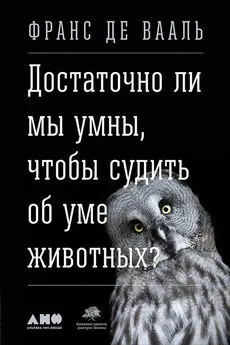


![Франс Вааль - Последнее объятие Мамы [litres]](/books/1075030/frans-vaal-poslednee-obyatie-mamy-litres.webp)
